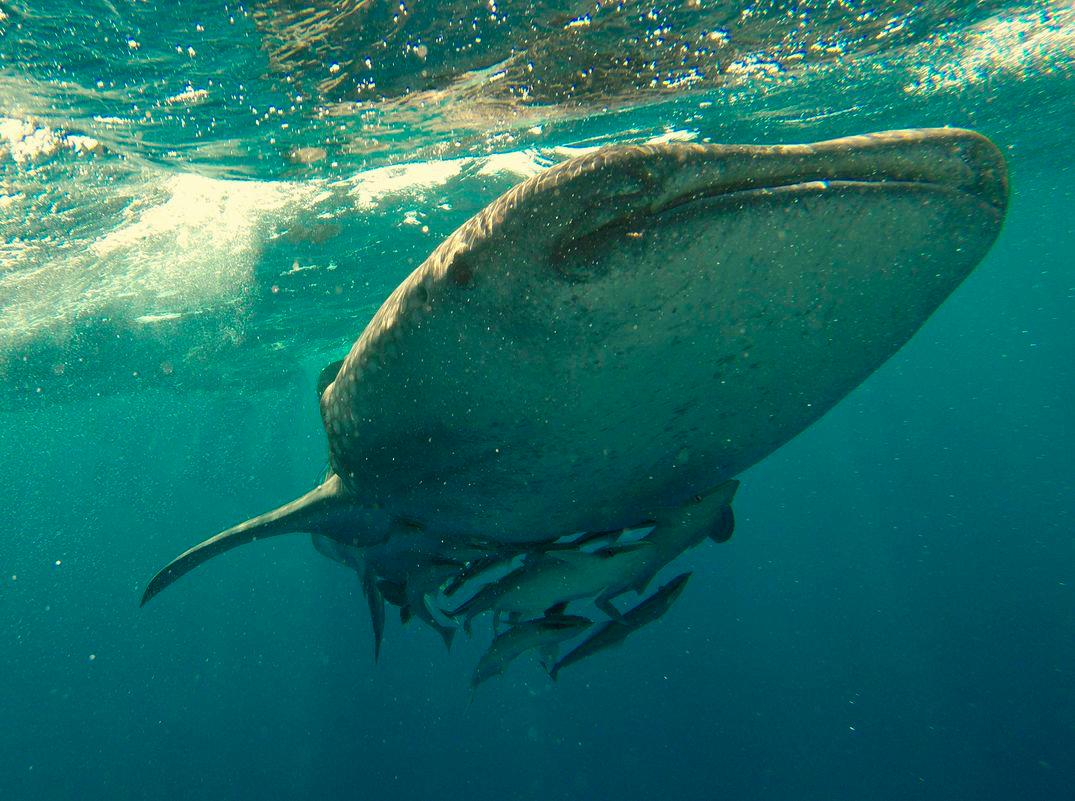PETALING JAYA: Sharks caught in Malaysian waters are mostly by-catch and not the main target of fishermen, according to the Southeast Asian Marine Resources Institute.
It said those landed were solely for domestic consumption and not sold or exported abroad.
“A total of 5,610 tonnes of sharks were landed in 2024, a slight decrease from 5,737 the previous year.
“None of the five shark species – the Great Hammerhead, Smooth Hammerhead, a Hammerhead sub-species, Oceanic Whitetip and the Whale Shark (pic) – listed under the Fisheries (Control of Endangered Species of Fish) (Amendment) Regulations 2019 have been landed, as fishermen are now more aware of the prohibitions in place.”
The institute also said most of the shark species landed were those commonly found in Malaysian waters, and the Fisheries Department remains highly proactive in ensuring that shark catches are carried out sustainably, without causing a significant decline in population.
Universiti Malaysia Terengganu (UMT) Faculty of Fisheries and Food Science deputy dean (Academic and Student Affairs) Assoc Prof Dr Rumeaida Mat Piah said sharks play a crucial role in maintaining the health of marine park ecosystems.
She added that a decline of shark populations could have serious negative impacts on coral reef ecosystems and marine biodiversity at marine parks.
“As apex predators, their absence could trigger a cascade of effects, such as imbalances in prey population, alterations in habitat structure and a reduction in overall biodiversity.
“Based on current data, it is hard to say if landing over 5,000 tonnes of sharks is a cause for concern, as there is no set limit for what is considered too much.
“The drop could mean fewer sharks in the sea or simply less fishing activities targeting them.
“Further research is needed to estimate the maximum sustainable yield or precautionary threshold for shark landings to serve as a benchmark for sustainable management.”
Rumeaida highlighted that Malaysia has taken steps to protect shark populations, including supporting the Food and Agriculture Organisation International Plan of Action for Sharks and developing two national shark conservation plans in 2006 and 2014.
She stressed that shark management requires a mix of strategies, such as international cooperation, sustainable fishing, protecting habitats and addressing threats to vulnerable species.
“Malaysia already bans the exploitation of endangered shark species under the Fisheries Act. Marine parks protect key habitats, harmful (fishing methods) such as pukat pari are banned, and artificial reefs help support shark breeding.
“More can be done, such as introducing catch quotas, minimum size limits and better fishing methods to avoid unintentional shark catches. For this, more detailed and widespread biological data is needed.”
Rumeaida said UMT has been working closely with the department and WWF-Malaysia since 2022 on a study titled “Understanding the Fisheries, Biological and Socio-Economic Aspects of Threatened Sharks and Rays” in the East Coast of Peninsular Malaysia, of which she is project leader.
“Through this research, we have collected valuable biological data, including age, growth, reproductive status and genetic structures, identified key hotspot areas and proposed practical mitigation measures based on socio-economic risks and feasibility assessments.
“With the ongoing efforts and strong commitment of the department and WWF-Malaysia, shark populations in Malaysian waters can be sustained,
but further steps such as stronger enforcement, catch limits, improved fishing methods selectivity and more population studies are needed to support future species-specific management plans.”
She also said a common misconception is the small number of sharks seen at markets or landing ports has little impact.
“But unlike bony fish, sharks grow slowly, mature late, have long gestation periods, produce very few offspring and may not reproduce every year. These traits make them highly vulnerable to overfishing and slow to recover once their numbers decline.”
She added that addressing overfishing and illegal shark harvesting in ecologically sensitive areas requires a comprehensive approach that includes stricter regulations, enhanced enforcement, community involvement, the promotion of sustainable fishing practices and increased investment in research and monitoring efforts.









